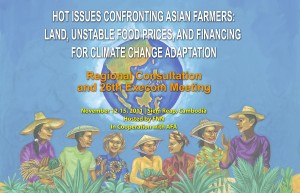Siem Reap, Cambodia — Farmer leaders from 12 Asian countries gather in this city, famous as the gateway to Angkor Wat, in order to discuss challenges facing small farmers and ways on how to address them.
Hosted by Farmer and Nature Net (FNN), in cooperation with the Asian Farmers’ Association (AFA), the “Regional Consultation on Hot Issues Confronting Asian Farmers: Land, Unstable Food Prices, Financing for Adaptation to Climate Change and 26th AFA ExeCom Meeting” will be held on November 12-15, 2011 at the City River Hotel.
Farmer leaders from 10 national level organizations in Southeast Asia, as well as 2 partner organizations from South Asia will share their experiences and analysis of the issues and help come up with policy recommendations for governments, inter-government bodies, and civil society organizations.
AFA member organizations include API (Indonesia), PAKISAMA (Philippines), FNN (Cambodia), SKP (Thailand), VNFU (Vietnam), KAFF & WAFF (Korea), TDFA & TWADA (Taiwan), and AINOUKAI (Japan), while partner organizations include KKM (Bangladesh) and Nepal (NLRF).
The 4-day event has the following objectives:
1) gather the situation about agricultural land investments, food price volatility and effects of climate change on Asian small scale women and men farmers;
2) increase the understanding of key farmer leaders and NGO support groups on large scale land acquisitions, food price volatility, climate change, as well as the initiatives and proposals of various inter-governmental agencies and other key stakeholders (e.g. the FAO Voluntary Guidelines on Land Tenure, the WB policy of Responsible Agro-Investment, proposals from business sector, local food reserve, if any);
3) develop policy and program proposals on large scale agricultural land investments, food price volatility and climate financing, which will be articulated during national, regional and international processes; and,
4) give updates on AFA secretariat and members’ actions, decide on organizational matters and discuss ideas for future project proposals that can be submitted by AFA.
Just over two years after the 2008 food price crisis, the international community has been concerned again with high food price levels in the international markets. Many governments, international agencies and producer organizations are currently involved in debates about food price volatility and what policy responses can mitigate and reduce its impact on poor consumers. Farmers’ organizations are likewise asked how price volatility impacts small scale producers. What causes food price volatility? What policies and programs can help mitigate food price volatility? A High Level Expert Panel (HLPE) on Food Price Volatility has recently released a draft paper which will be used to inform members of the Committee on Food Security (CFS) in its upcoming meeting in October 2011, as well as to guide them in appropriate policy measures to be taken at the regional and national levels.
Increasing large-scale investment in land, particularly in the agricultural sector, but also including other sectors such as mining, agro–fuels, tourism, forestry and carbon sequestration, is of interest and concern to a wide variety of organizations globally, including Asia. The phenomenon raises fundamental questions on land rights, development and food security, with diverse views being held by different stakeholders. While there is agreement that the implications of this trend are far-reaching, opinion is sharply divided on what these implications might be. Responses have focused on the social, economic and environmental risks it poses, and/or on the possible opportunities arising from increased investment in agriculture and other rural sectors. Up for discussion during the upcoming Committee on Food Security (CFS) meeting in October 2011 is the FAO draft on Voluntary Guidelines on Land Tenure, which can guide governments on how to tackle the issue on agricultural land investments.
A new climate deal is being forged among parties to the UN Framework on Climate Change Convention (UNFCCC). Many agriculture-related CSOs, including AFA, would like climate financing to be directed to adaptation and mitigation in agriculture by small-scale women and men farmers. But debates are getting complicated with many large agri-business companies heavily lobbying for support for carbon markets. Farmers’ organizations need to understand these complications and strategize how national government negotiators can carry their key messages in climate financing.




Comments are closed